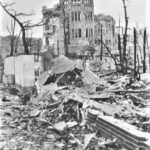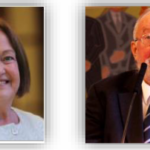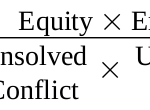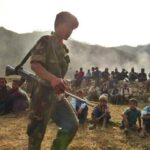Articles by Bishnu Pathak
We found 70 results.
India-Pakistan Escalation of Conflict: Promoting Positive Peace Through a Bottom-up Approach
Bishnu Pathak – TRANSCEND Media Service,
19 May 2025
15 May 2025 – Since the partition from India in 1947, Pakistan has been engaged in around a dozen significant and minor conflicts with India. Wars and negotiations are carried out based on the interests and directives of the respective central governments.
→ read full articleMagna Carta of Peace
Bishnu Pathak – TRANSCEND Media Service,
24 Mar 2025
21 Mar 2025 – The Magna Carta was established in 1215 as a historic legal document in England. In contrast, the Magna Carta of Peace is nothing more than a Peace Accord. The MCP symbolizes unity, cooperation, collaboration, and harmony in society promoting reculturation and transitional justice.
→ read full articlePerpetual Peace by Johan Galtung
Bishnu Pathak, Ph.D. – TRANSCEND Media Service,
2 Dec 2024
Perpetual peace advocates for conflict resolution, transformation, and management through peaceful and prosperous means. The aim of this study is to contribute to a deeper understanding of Professor Johan Galtung and his efforts towards achieving perpetual peace.
→ read full articlePerpetual Peace Plan for the Russia-Ukraine War
Dr. Bishnu Pathak, et al. – TRANSCEND Media Service,
4 Nov 2024
31 Oct 2024 – The Russia-Ukraine war is the most destructive and contentious since WWII. The involvement of the USA with financial aid, strategic defense guidance, and military supplies to Ukraine has transformed it into a war between the USA and Russia.
→ read full articleNuclear Civilization for Peace Science in a Harmonious Multipolar Future
Bishnu Pathak, Mairead Maguire, et al. – TRANSCEND Media Service,
2 Sep 2024
30 Aug 2024 – From Hiroshima and Nagasaki to Western and Alternative Globalization – This paper, by coauthors from the Gandhian Global Harmony Association, commemorates the 79th anniversary of the tragedy that occurred in the Japanese cities of Hiroshima and Nagasaki.
→ read full articleGandhian Spherons: India/Nepal Return to the Varnas Peace World Leadership
Bishnu Pathak, at al. - TRANSCEND Media Service,
20 May 2024
Abstract – This paper summarizes 16 years of research by the Gandhian Global Harmony Association’s humanities scientists in the field of the genetic thermodynamic cybernetic social structure of nonviolence spherons and its empirical verification by world statistics.
→ read full articleTransitional Justice (Part 57): Six-Pillar of Transitional Justice
Bishnu Pathak, Ph.D. – TRANSCEND Media Service,
22 Apr 2024
Transitional justice is to address past atrocities by bridging the gap between old and new regimes during democratic transitions. It signifies the shift from conflict to peace and political reforms through peaceful means.
→ read full articleTransitional Justice (Part 56): Rohingya the Voiceless, Stateless Refugees
Bishnu Pathak – TRANSCEND Media Service,
18 Mar 2024
The politico-legal aspects of Transitional Justice are a complex final stage in conflict transformation by peaceful means to identify the truths of victims and perpetrators. It encompasses two interconnected components: truth-seeking and judicial accountability.
→ read full articleEastern Philosophy
Bishnu Pathak and Susmita Bastola – TRANSCEND Media Service,
1 May 2023
27 Apr 2023 – This study contributes to a wider understanding of international relations and philosophies in a world where the balance of power is shifting and emerging as superpower countries India and China are increasingly growing in importance.
→ read full articleEmpire of Jingoistic Lies
Bishnu Pathak – TRANSCEND Media Service,
10 Apr 2023
8 Apr 2023 – How the US and its military alliance created, encircle, attack, and destroy potential rivals, governments and leaders abusing their (including NATO) powers through proxy politics and victor-centric justice. NATO is a collective, defensive, rich countries’ alliance that functions under control/leadership of the USA.
→ read full articleThe Tokyo Tribunal: Precedent for Victor’s Justice II
Prof. Bishnu Pathak – TRANSCEND Media Service,
30 Aug 2021
This paper aims to find out the situations of the investigation, prosecution and punishment, and analyse the preference for justice: victor’s justice or victim’s justice. During World War II, anti-communist Emperor Hirohito actively led Japan decorated by the Army’s uniform but pretended to be a ceremonial Emperor making scapegoats to his opponents.
→ read full articleNepo-India Territorial Disputes Transformation by Dialogue Means
Bishnu Pathak - TRANSCEND Media Service,
15 Mar 2021
March 2021 – A territorial dispute occurs when official government representative of one country release explicit statement(s) claiming sovereignty and integrity over a specific portion of territory that is claimed or administered by another country. It is an explicit contention between two or more nation-states over a specific piece of the terrestrial territory. The ‘Issue Correlates of War Project’ identifies over 800 territorial disputes occurred internationally since 1816.
→ read full articlePrime Minister’s Constitutional Coup: Nepal Heading to People’s Movement III
Prof Bishnu Pathak – TRANSCEND Media Service,
22 Feb 2021
21 Feb 2021 – This state-of-the-art paper is prepared based on personal experiences, participant observation, literature review, and exchanging and sharing approaches rather than on theoretical conceptions.
→ read full articleJohan Galtung’s Conflict Transformation Theory for a Peaceful World
Bishnu Pathak, Ph.D. – TRANSCEND Media Service,
5 Oct 2020
The paper highlights how the contributions of Johan Galtung has been able to change the institutional and individual attitudes, conviction systems, psychological understandings, and lifestyle of behaviors through applying transcend technique of conflict transformation.
→ read full articleNuremberg Tribunal: A Precedent for Victor’s Justice
Prof. Bishnu Pathak – TRANSCEND Media Service,
21 Sep 2020
21 Sep 2020 – The specific objectives of the paper are to identify the situations of the investigation, prosecution and punishment to the Nazi war criminals on accountability for justice and to analyse the preference for justice: victors’ justice or victims’ justice. Experiences on Transitional Justice, Human Security, and Human Rights, among others, touched, inspired and motivated the author for this pioneering paper.
→ read full articleCan Former Child Soldiers File a Complaint at the International Court against Nepal’s Maoist Leaders?
Prof. Bishnu Pathak – TRANSCEND Media Service,
7 Sep 2020
24 Aug 2020 – This state-of-the-art paper is prepared to review the voices of the former child soldiers (under the age of 18) recruited by the Maoist Army during the People’s War (1996-2006) in Nepal. The former child soldiers were used as informers, porters, messengers, cooks, and dancers among others. The United Nations Mission in Nepal (UNMIN) verified a few thousands of child soldiers within the Maoist Army. The former child soldiers suffered from all concerned institutions.
→ read full articleCritiques on the Tribunals and The Hague Court
Prof. Bishnu Pathak – TRANSCEND Media Service,
27 Jul 2020
27 Jul 2020 – This critique is a review of heinous crimes. It assesses to connect with perpetrators, victims, people and institutions and change professed through the works of the Tribunals and The Hague Court and share the feeling with the concerned ones. The objectives of the paper are three-fold: (1) to study the situations of the investigation, prosecution and punishment on accountability; (2) to analyze the preference for justice: victors’ justice or victims’ justice; and (3) to access the critiques on violations of human rights and humanitarian law beyond the borders.
→ read full articleTransformation of War Politics to Politics of Nonviolence
Prof. Bishnu Pathak – TRANSCEND Media Service,
16 Mar 2020
12 Mar 2020 – The book Gandhica focuses on Mahatma Gandhi’s ideal for the science of nonviolence. The book particularly advocates for spherons, partons and Tetranet Thinking as a principal new scientific interpretation and the fundamental social rationale.
→ read full articleJurisdictions of The Hague Court
Prof. Bishnu Pathak – TRANSCEND Media Service,
2 Mar 2020
26 Feb 2020 – This state-of-the-art paper is prepared based on archival literature review, exchanging and sharing, Rome Statute defined functions and a practical observation approach rather than theoretical conception. The Hague Court gathers and scrutinizes testimonies, questioning victims and witnesses and analyzes the shreds of evidence of a suspect’s innocent or guilty.
→ read full articleNepal Maoist Leaders: The Hague Journey!
Prof. Bishnu Pathak – TRANSCEND Media Service,
30 Sep 2019
23 Sep 2019 – Child soldiers are children under the age of 18 who are recruited by armed organizations, state-and-non-state forces. They are trained for informants, spies, porters, messengers, sentries, cooks, and often used for sexual purposes and as human shields. Children are easily trapped appealing for hope of better future and are trouble-free targets for military recruitment owing to their grater defenselessness to influence compared to the grown-ups. Girls are at high risk of rape, other forms of degrading treatment, and those who have had pregnancies or babies are often rejected by their own families or communities.
→ read full articleGenerations of Transitional Justice in the World
Bishnu Pathak – TRANSCEND Media Service,
29 Jul 2019
The objectives of the paper are to investigate the axiomatic truth and record the human wrongdoings of the past, deliver justice to the victims at present, make perpetrators accountable and initiate generous change in the rule of law for prosperous, peaceful and harmonious nation. The state-of-the-art paper is prepared based upon literature review, exchanging and sharing, and a practical observation approach rather than theoretical-analytical conception, except Generation.
→ read full articleProcess Documentation of Interfaith Peacebuilding Cycle: A Case Study from Nepal
Prof. Bishnu Pathak – TRANSCEND Media Service,
6 Aug 2018
4 Aug 2018 – Abstract: The concept of this study was to explicitly define the characteristics of Process Documentation (PD), a unique type of record keeping system. The PD is a process of lessons learned-centric piloting approach which is a neologism in Social Science research. The PD moves forward “anti-clock-wise” direction and generally applies to humanitarian agencies in support, care and emergency relief programs to deliver basic services to needy people.
→ read full articleWorld’s Transitional Justice Ironically Ensures Freedom to the Perpetrators Further Limiting Justice to the Victims
Prof. Bishnu Pathak – TRANSCEND Media Service,
30 Jul 2018
30 Jul 2018 – The objective of this writing is to dig out the abstract meanings from a Nepali language paper on Transitional Justice Practices in the World: Truth, Justice and Prosecution Being Shadowed. Transition is a gap period between the two-Government systems: old (past) and new (present and future). This is the situation when neither the old system (government) is completely collapsed nor a new one is fully established.
→ read full articleA Comparative Study of World’s Truth Commissions: From Madness to Hope
Prof. Bishnu Pathak – TRANSCEND Media Service,
3 Jul 2017
The objective of this paper is to explore the initiatives and practices of different countries in truth seeking. Many countries during the post-conflict, colonial, slavery, anarchical and cultural genocide periods establish the Truth Commissions to respond to the past human wrongdoings: crimes and crimes against humanity. Enforced disappearances, killings, rapes and inhumane tortures are wrongdoings.
→ read full articleJohan Galtung’s Conflict Transformation Theory for Peaceful World: Top and Ceiling of Traditional Peacemaking
Prof. Bishnu Pathak – TRANSCEND Media service,
29 Aug 2016
Galtung has developed the TRANSCEND Method (conflict theory and practice, violence theory and practice, peace transformation, dialogue, and negotiation) to transform the conflict by peaceful means constituting a three-step approach, generally called TRANSCEND or Galtungian method.
→ read full articleWorld’s Disappearance Commissions: An Inhuman Quest for Truth
Prof. Bishnu Pathak – TRANSCEND Media Service,
13 Jun 2016
Disappearance entails violation and abuse of many fundamental human rights: the right to liberty, to personal security, to humane treatment, freedom from torture and other cruel treatment, the right to a fair trial, to legal counsel, to equal treatment before and under law, to receive correct information, and the right of innocence unless proven guilty by the national and international human rights instruments.
→ read full articleImpacts of India’s Transit Warfare against Nepal
Professor Bishnu Pathak – TRANSCEND Media Service,
19 Oct 2015
The present crisis of Nepal, rather than being homegrown, has been imported from India. All agitating Tarai-Madhes leaders accepted that they are being backed by India. There is a huge voice to take stern action to Ambassador Rae against the Goebbels’-style reporting.
→ read full articleEnforced Disappearance Commission: Truth, Justice and Reparation for Dignity
Prof. Bishnu Pathak - TRANSCEND Media Service,
24 Aug 2015
Enforced disappearance is a prototypical continuous act. The act occurs when a person secretly arrests, detains, tortures and disappears by conflicting forces, but refuses to acknowledge whereabouts of his or her fate . The dead body decomposes in such a way as not to ever be found.
→ read full articlePost-Earthquake to Relief Fund: Roles of Aid Agency, Nation in Nepal
Professor Bishnu Pathak - TRANSCEND Media Service,
8 Jun 2015
About six-dozen nations-states assisted on humanitarian aids and supplies in post-quake survivors. Among them, military with sniffer dogs from 18 countries arrived soon in Nepal. Nepalese Government failed to assure and maintain disaster aid diplomacy. Aid agency’s lost hope shall only be regained if a new national Government is formed soon.
→ read full articleAn Impact Assessment of a Great Earthquake in Nepal
Prof. Bishnu Pathak – TRANSCEND Media Service,
25 May 2015
A devastating 7.8 magnitude earthquake on April 25, 2015 disrupted the lives of nine million people – almost a third of the population. A second one of magnitude 7.3 on May 12 further complicated getting aid to survivors mainly in the central Nepal. Thus, the challenge of quake is being turned to opportunity to make a new Nepal forming a national Government headed by a clean, dynamic and honest leadership.
→ read full articleNepal’s Enforced Disappearance Commission: Roles of International Community
Dr. Bishnu Pathak - TRANSCEND Media Service,
18 May 2015
Enforced disappearance has been a long, but a neglected history in Nepal. It is derived from the laws of war where a person secretly arrest, detain, torture and disappear either by a State or armed force refusing to acknowledge whereabouts of his/her fate. The force tries hard to decompose the dead body in such a way not to ever be found.
→ read full articleForeword to “$$$$$$s in Their Hearts”, the New Book by Alberto Portugheis
Bishnu Pathak, Ph.D. – TRANSCEND Media Service,
10 Nov 2014
[TRANSCEND member] Portugheis argues for a total change of organisational and individual perception, stressing that even most of the human rights organisations (such as Amnesty International, Human Rights groups, anti-war campaigners, including political leaders) do not speak of a weapon-free world. His motto of Enlightenment is to launch a campaign to educate and to promote a world free of militarism, thus free of war.
→ read full articleIndia’s PM Modi towards World’s Top Leader Keeping Confidence with Neighbors
Bishnu Pathak – TRANSCEND Media Service,
15 Sep 2014
The principal reason of insecurity to Modi is that he is speeding up his social doctrine to respect, protect, preserve, and promote poor, marginalized, disadvantaged, and vulnerable people, not limiting him within the border, but beyond of it.
→ read full articleFreedom
Prof. Bishnu Pathak – TRANSCEND Media Service,
7 Jul 2014
Bishnu Pathak’s introduction to Alberto Portugheis’ book, ‘$$$$$s in Their Hearts,’ which will be launched soon. “Portugheis puts emphasis on the fact that weapons do not exist “for Peace”. They will never bring about Peace. Some of his aims are: to ensure basic support for the needy, (to stop them being “needy”) restrict weapon manufacturing to cover Police needs, abolish the Arms Trade and the disbanding of all armed forces.”
→ read full articleHuman Security and Human Rights Harmonious to Inharmonious Relations
Dr. Bishnu Pathak – TRANSCEND Media Service,
17 Mar 2014
Abstract – Human security and human rights are universal phenomena, poor to rich and individual to all people in the universe. Human security and human rights are harmonious to inharmonious natures. Human security is state to people-centered notion, whereas human rights are human-centered more.
→ read full articleTransformative Harmony and Inharmony in Nepal’s Peace Process
Bishnu Pathak – TRANSCEND Media Service,
6 Jan 2014
Abstract: Two lines of thoughts: ‘first, the Maoist Army integration either into Nepal Army or society is an end of peace process and second, the integration is a part of it’ are available in Nepal. The parties empowered by power, politics and property argue as former and majority of general people and other forces believe on latter.
→ read full articleElections to Constituent Assembly II – Voice of the Voiceless People of Nepal
Prof Bishnu Pathak – TRANSCEND Media Service,
28 Oct 2013
The term “voiceless” represent from among the people who live both at countryside and urban center, but their voice do not necessarily influence the policy formation or decision making at the center. They are the neutral people in all professions often used as elevators by the parties and leaders for their specific purpose, simply vote-banks.
→ read full articleOrigin and Development of Human Security
Prof. Bishnu Pathak – TRANSCEND Media Service,
1 Jul 2013
Human security is complementary to human rights. It is a comprehensive, interrelated, and coordinated concept that encompasses freedom from want, freedom from fear, freedom to live in dignity, and freedom to inherit pro-nature environment for forthcoming generations as fundamental rights.
→ read full articleNepal’s First Peace Event 2013 with Prof. Dr. Johan Galtung
Dr. Bishnu Pathak – TRANSCEND Media Service,
11 Feb 2013
Perhaps an internationally acclaimed person of authority on conflict transformation by peaceful means may ignite the political consensus process amongst the concerned stakeholders and actors of Nepal. In the context, it is natural to have great expectations from the Founding Father of Peace Studies in the world, Professor Dr. Johan Galtung, who is visiting Nepal for the first Peace Event in Kathmandu from February 10th to 18th, 2013.
→ read full articleTransitional Security
Bishnu Pathak, PhD – TRANSCEND Media Service,
4 Feb 2013
Prime Minister of Nepal said, “Peace process is ended completing the integration of the Maoist Army (MA)” . PM counted it as a major achievement. Same sentence was also said by Nepali Congress, CPN (UML), and other political parties every day previously. Such speaking raised several questions.
→ read full articlePrinciples of Harmony
Bishnu Pathak, PhD- TRANSCEND Media Service,
3 Dec 2012
Peace is the process for perfection whereas harmony is a perfect relationship. Peace may be experienced alone by a person whereas harmony is a systematic character between two or more persons or parties; harmony is always a plural condition. Peace may be enjoyed alone; harmony is living together peacefully. Peace implies calmness; harmony requires unity.
→ read full articleThe ABC of Harmony
Dr. Bishnu Pathak* - TRANSCEND Media Service,
15 Oct 2012
This is the first exclusive book to deal scientifically on harmony, harmonious civilization, harmonic education, and cross-cultural dialogues across the world at local, regional, national, and international levels.
→ read full articleFederalism Risk Assessment
Bishnu Pathak, PhD – TRANSCEND Media Service,
6 Feb 2012
Today, 40 percent of the world population lives under the rule of a federal state, but 60 percent under unitary. 30 (16% out of 192 UN members) matured, emergent, and micro-federations practice federalism. They are comprised not only of powerful and developed nations, but developing countries as well.
→ read full articleNepal: Announcement of Federal States Is the Beginning of the End of the Country
Dr. Bishnu Pathak – TRANSCEND Media Service,
30 Jan 2012
Sujit Mainali for The Telegraph Weekly and its online edition telegraphnepal.com approached and interviewed this scholar on several aspects of Nepali politics, ongoing peace process and security related issues. Below the excerpts of this exclusive interview: Chief Editor.
→ read full articleThe Issue of Federalism in Nepal Appears More Complex than the Peace Process and Constitution Writing
Dr. Bishnu Pathak (Nepal) – TRANSCEND Media Service,
30 Jan 2012
Federalism in present Nepal has become a topic of great contention.
→ read full articleCivil-Military Relations: Theories to Practices
Bishnu Pathak, PhD and Surendra Uprety – TRANSCEND Media Service,
7 Nov 2011
Civil Military Relations constitute the relationship between the state and civil society on one side and the military organization(s) on the other. They correlate the civilian and military authorities in a given society. Democratic Civilian Control (DCC) is the conception of military/armed forces controlled by the elected representatives of a given state or nation.
→ read full articleWomen and DDR-Disarmament, Demobilization, Reintegration
Bishnu Pathak, PhD – TRANSCEND Media Service,
12 Sep 2011
The paper provides an overview of the Disarmament, Demobilization, and Reintegration (DDR) practices existing in the world. It researches when and for what purposes the United Nations initiate DDR programs in post-conflict countries. It examines the scale and consequences of the various roles of ex-combatants, particularly the women ex-combatants in a transitional society. It aims to compare and explore some of the best and worst practices of DDR and militarized masculinity before, during, and after the violence. Secondary literatures mostly draw on to learn from yesterday, analyze to live for today, and encourage to hope for tomorrow.
→ read full articleApproaches to Citizen-Centric Policing
Bishnu Pathak, PhD – TRANSCEND Media Service,
13 Jun 2011
Citizen-Centric Policing (CCP) or Neighborhood Policing (NP) is radar of Community Policing (CP). The CP is a policing practice that aims to increase interaction between citizens and police officials for public safety and quality of life in the community. More than tactics, strategy, and technique, it has become the national mantra to spring up in urban, suburban, and even rural police departments or police stations. The CP promises to change relationships progressively to improve the living conditions of neighborhoods.
→ read full articleInsecurity in Security
Bishnu Pathak, PhD, Peace and Conflict Studies Center – TRANSCEND Media Service,
16 May 2011
The burgeoning Chinese, Indian and Pakistani influence raises alarm in transitional Nepal which has an open border with both China and India. Escalating Chinese influence in Nepal has been a grave concern to India. Indeed, a small land-locked country surrounded by two of the world’s most populous and growing superpower nations, Nepal is caught in a unique pull-push insecurity situation as it gropes for true democracy.
→ read full articleThe UN Mission in Nepal-UNMIN’s Humiliating Withdrawal
Bishnu Pathak, PhD – TRANSCEND Media Service,
21 Mar 2011
The UNMIN obtained a final four-month extension effective from September 16, 2010 till January 15, 2011. The UNMIN ended its role owing to heavy criticism from non-Maoist parties and returned from Nepal. It withdrew leaving reintegration, rehabilitation and democratization half-way, unlike many other UN missions in the world… A Special Committee (SC) has replaced the UNMIN and implements its mandate against provisional ethics. The UNMIN was established under Nepal’s special circumstances. It was a neutral and common platform while the SC mostly comprises political actors on the basis of a political decision. The role of the SC is neither defined by agreements and accords, nor does it have constitutional authority. There is also no role for neutral experts.
→ read full articleLessons Learned from Nepal’s People’s Victory 2006
Bishnu Pathak, PhD – TRANSCEND Media Service,
7 Mar 2011
After successfully ousting Tunisian and Egyptian tyrannical regimes, the oppressed masses have taken to the streets of numerous cities in the Arab World with the hope that change for freedom is possible. The Arab world has a long history of frozen conflicts, but from the gravity of events in the first quarter of 2011, it has already been a year of people’s uprising.
→ read full articleUNMIN’s Withdrawal Formally Winds up Maoist Army Cantonment and Barracking of the Nepal Army
Bishnu Pathak, Ph.D. – TRANSCEND Media Service,
20 Dec 2010
The Sanskrit adage Buvukshitah kim na karoti papam? (What vice is unthinkable to an empty stomach?) occurred in mind when we (including Freelance Journalist Jibanath Khanal) were deliberating upon the “U-turn” of Nepal’s peace process, wondering whether the successor of UNMIN could take over the monitoring and supervision of the arms and armies. While a full-stomach seeks freedom first, an empty stomach looks for food above all temptations.
→ read full articleApproaches to Peacebuilding in Nepal: Experiments in Various Dimensions
Bishnu Pathak, Ph.D., Peace & Conflict Study Center, Nepal – TRANSCEND Media Service,
15 Nov 2010
During the Cold War, the world was largely divided into two opposing camps, capitalism and communism. Johan Galtung, the father of peace studies, has stated that nationalisms, ethnicities and religious identities in the post-Cold War era have led Western intellectuals to reconsider the role of these factors in the developing world order (Galtung 2008a: 10).
→ read full articleNepali Diaspora in Australia
Bishnu Pathak, PhD, Peace and Conflict Study Center – TRANSCEND Media Service,
6 Sep 2010
The author visited Centre for Peace and Conflict Studies (CPACS) at the University of Sydney to participate at the TRANSCEND Global Meeting; “Enabling Peace: Pedagogy and Training”, in early July 2010. The meeting was approved to establish the TRANSCEND Peace University (TPU), South Asia Regional Chapter, the first ever in Nepal. While I visited John Street in Grandville, in the New South Wales Sydney, I found a total of 12 Nepali families.
→ read full articleAssessing Maoists Janaandolan III in Theory
Bishnu Pathak, Ph.D. - TRANSCEND Media Service,
31 May 2010
Puspa Kamal Dahal alias Prachanda, Chairperson of the United Communist Party of Nepal or UCPN (Maoist), has time and again said that the party he represents is being isolated from the mainstream power-politics. Grave connotations can be drawn from this juncture of peace and epoch of constitutional writing.
→ read full articleNepal’s Peace Process Towards Ambiguity
Bishnu Pathak, Ph.D. – TRANSCEND Media Service,
12 May 2010
At 2.20 PM on May 1, 2010 at the western gate of the Khula Manch (Martyr Theater), an aged, thin-and-weak man of about 35 fainted. The volunteers of the United Communist Party of Nepal (Maoist) made a human chain of 10 meters in circumference around the huge crowd. A few of them tried to cool him down by fanning their caps and papers and throwing their drinking water over him. Both of his legs were buckled from the intense heat, while camera men were eager to snap photos. The crowd members were seeking first aiders to treat him. Two minutes later, he stood up with the help of a man. His face and lips were dried. A woman aiding him grasped his right hand and disappeared with him through the sea of humans.
→ read full articleA Darkening Scenario in Nepal
Bishnu Pathak, PhD – TRANSCEND Media Service,
26 Apr 2010
Nepal may again find itself in the middle of a deep national crisis if a new Constitution is not announced by the stipulated date.
→ read full articleSTRUGGLING FOR TRUE SOVEREIGNTY
Bishnu Pathak, PhD – TRANSCEND Media Service,
5 Apr 2010
Land-locked Nepal has always existed in giant India’s shadow. However, now that its people have tasted democracy, they want to shake off Indian influence and become masters of their own destiny. Nepal has long historic, strategic, geo-political, commercial and socio-cultural relations with India. There has been a protracted debate and discourse to continuously improve such […]
→ read full articleDISARMAMENT, DEMOBILIZATION AND REINTEGRATION, AND SECURITY SECTOR REFORM IN NEPAL: A PRELIMINARY SOCIOLOGICAL OBSERVATION
Bishnu Pathak, PhD & Devendra Uprety – TRANSCEND Media Service,
28 Mar 2010
1. Setting Security Sector Reform (SSR) is a continuous process to all countries and regions, including politically stable states, fragile states, and post-conflict countries. However, it is widely understood that there need to be urgent SSR priorities in countries emerging from large-scale violent conflict. Over the years, Nepalese society has undergone deep structural […]
→ read full articleCHILD SOLDIERS: CRIME AGAINST HUMANITY
Pawan Bimali and Bishnu Pathak, Ph.D. – Conflict Study Center, Nepal,
23 Dec 2009
Executive Summary Each year thousands of children under 18-year have been affected by armed conflict, directly and indirectly. They are recruited on the hope (of better future), fear, and insecurity. Child soldier is widely practiced in the form of spies, porters, messengers, cooks, lay or clear landmines, training or guarding other children, weapons transport workers, […]
→ read full articleTARAI-MADHES: SEARCHING FOR IDENTITY BASED SECURITY
Bishnu Pathak, Ph.D. and Devendra Uprety – Conflict Study Center, Nepal,
24 Oct 2009
Peace, justice and freedom must be major components of any future security in Nepal. However, Nepal’s transition is deepening in crisis due to the growing ranks of rebel forces, particularly in the Tarai-Madhes. While the State fails to deliver security to the ordinary people, particularly in countryside, the peace process of Nepal is endangered, justice […]
→ read full articleFEDERALISM: RISK ASSESSMENT
Bishnu Pathak, PhD,
16 Jul 2009
Today, 40 percent of the world population lives under the rule of a federal state, but 60 percent under unitary. 30 (16% out of 192 UN members) matured, emergent, and micro-federations practice federalism. They are comprised not only of powerful and developed nations, but developing countries as well; namely, Argentina, Australia, Austria, Brazil, Canada, […]
→ read full articleFEDERALISM: LESSONS FROM INDIA
Bishnu Pathak, Ph.D.,
21 Jun 2009
Indian federalism is the simultaneity of two processes – the unionization process and the regionalization process.– Ajay Kumar Singh Introduction India became independent in 1947. Its parliament, also serving as a Constituent Assembly (CA), drafted the new constitution that came into effect on January 26, 1950, establishing the federal union of India. India is the […]
→ read full articleNEPAL-INDIA RELATIONS: OPEN SECRET DIPLOMACY
Bishnu Pathak, Ph.D.,
31 May 2009
Setting The United Maoist-led Government resigned as of May 4, 2009 and its resignation has been accepted. Almost three weeks back, the senior UML leader, Madhav Kumar Nepal, who failed to win people’s trust in two constituencies he challenged in the last Constituent Assembly (CA) election, was unanimously elected as the second Prime Minister of […]
→ read full articleARMY IN POLITICS, POLITICS IN THE ARMY
Bishnu Pathak, PhD,
17 May 2009
Setting The confrontation between the United CPN (Maoist) and the then Royal Nepal Army began when the former first attacked the Army barracks in Ghorahi, Dang on November 24, 2001 and continued up to the initiation of the Popular Movement (Jana Andolan II) in April 2006. When the present Prime Minister (PM), Puspa Kamal Dahal, […]
→ read full articleNEPAL’S PEACE PROCESS AT THE CROSSROADS
Bishnu Pathak, Ph.D.,
17 May 2009
Setting The fluid political situation of the country culminated in the Government of Nepal ousting the Chief of Army Staff (CoAS), Rookmangud Katawal, and appointed Lt. General Kul Bdr. Khadka as Acting Head of the Nepal Army (NA) at 11.30 Hrs. on May 3, 2009. Alleging the executive power holder government’s decision unconstitutional, president Dr. […]
→ read full articleTHE CULTURE OF MILITARIZATION IN SOUTH ASIA – BOTH ARMIES’ NEW RECRUITMENT IN NEPAL
Bishnu Pathak and Devendra Uprety,
23 Mar 2009
1. The Setting South Asia is facing complexities due to a growing trend of militarization, exceeding that of political or ideological indoctrination. Military culture not only prevails in security forces and mainstream political parties, but is spread in the form of identity politics throughout class, group, community, institution, and so forth. This cultural force […]
→ read full articleMODELING THE INTEGRATION OF THE MAOIST COMBATANTS: DDR OR SSR?
Bishnu Pathak, Ph.D.,
18 Dec 2008
Conflict Study Center – Nepal A. Conceptual Clarity The Communist Party of Nepal (Maoist)-led Coalition Government constituted a High-Level five-member Special Committee for Army Integration (SCAI) on October 28, 2008 headed by Deputy Prime Minister Bam Dev Gautama for integration and rehabilitation of the Maoist ex-combatants into the new National Army. Other members are: Minister […]
→ read full articleTHE UNITED NATIONS: CHALLENGES FOR PEACE
Bishnu Pathak, PhD,
1 Nov 2008
“I object to violence because when it appears to do good, the good is only temporary; the evil it does is permanent.”-Mahatma Gandhi “We, the peoples of the United Nations, determined to save succeeding generations from the scourge of war, which twice in our lifetime has brought untold sorrow to mankind and to reaffirm faith […]
→ read full articleMAOIST NEW NEPAL: INDUSTRIAL CAPITALISM COVERED BY SOCIALISM
Bishnu Pathak PhD and Neil Horning. Assisted by Surendra Uprety (PhD student), Rushma Shakya, Rita Chaudhary, Ganga Puri and Meena Siwakoti,
6 Oct 2008
The reactions to the budget from the nation’s policymakers and critics are often guided by four motives. Those who made the budget in the past regard it as imbalanced and untenable and heap praise on their own budget. Others who suffered defeat in the CA polls from the Maoists are scared of the perpetual marginalization […]
→ read full article









